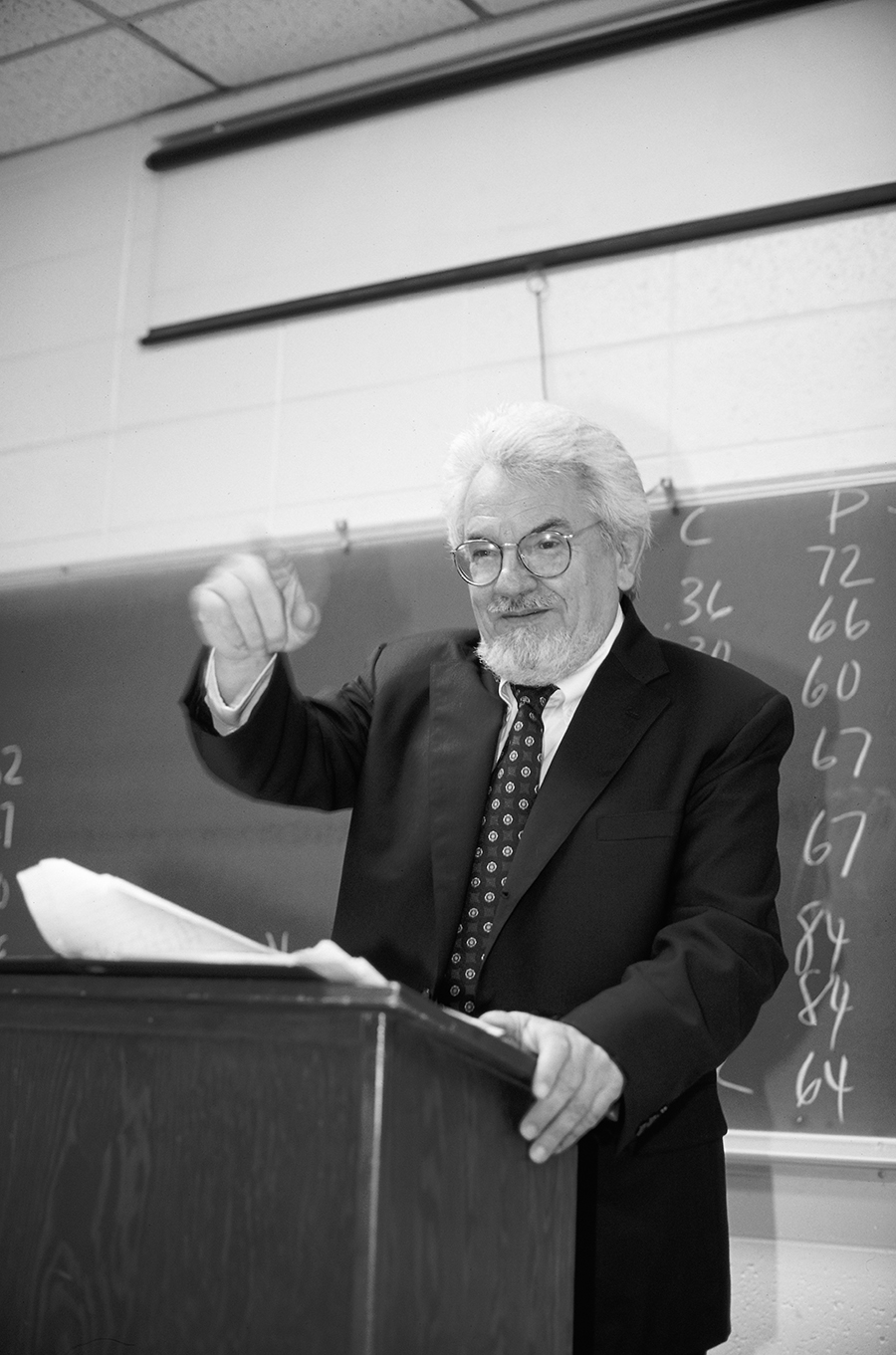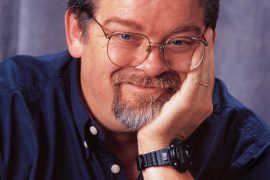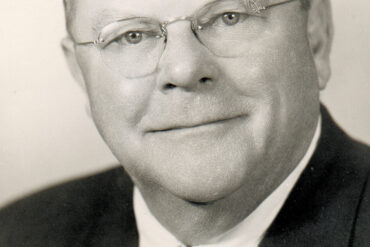A mix of appearance, intellect and humor make Dr. Simon Perry the epitome of the college professor
By Mary Calhoun Brown
HQ 22 | AUTUMN 1995
Deep in the shady mountains of West Virginia in a little town called Gilbert, a young man returned home from the University of Tennessee. Sparked with the fire of fresh knowledge, Simon Perry was waiting to be drafted into military service. Little did he know at the time he was about to take an unexpected path that would lead him into a distinguished career as a much-loved and respected professor.
Simon Perry was not unused to taking the road less traveled. At an early age he found himself intrigued by politics. His father, Uley, an imposing figure at 6 feet 3 inches, saw politics as a game.
Although Simon’s father had only a fourth grade education, he continued to educate himself every day of his life. He served as a deputy sheriff, a committeeman and participated in every election.
There was something unusual about Uley, however. He was the only Republican in Gilbert, W.Va.
To Uley, supporting the Republican party was much like Huntingtonians supporting the Herd. The issues weren’t that important to him as far as party loyalty was concerned. He and young Simon discussed President Franklin Roosevelt’s increasing power, the insufficient checks and balances on the president and the corrupt nature of the local Democratic party.
Uley’s political interests caused quite a stir in Gilbert. In fact, when the Perrys’ road in Gilbert was being paved, the pavement stopped a half mile short of their home.
“The dust was awful in the summer,” reflects Dr. Perry. “The grass was so dusty, it looked as if it had gone on welfare, too. I’m not certain if politics had anything to do with the road, but we thought it did.”
Like everyone else, the Perry family was not what you would call “well off” in the 1930s. But Charles Peak Sr., an owner of a Ford dealership in Gilbert, convinced Uley Perry to send his daughter, Garnet, to college. And all but one of his seven children followed.
Simon was one of only five of his high school classmates to go off to college. He chose Berea College in Kentucky, where he graduated in 1954.
After earning an A.B. in Political Science and History, Perry went to the University of Tennessee to study political science.
In 1955 he completed his master’s work and soon found himself back at home, sitting in the living room, waiting to be drafted when his sister, Garnet, approached him with an idea. She was devoted to hard work and was troubled to see her younger brother just waiting around (although he was working on revisions for his masters’ thesis at the time).
“Garnet couldn’t stand the thought of me sitting around and asked me what I could do as I waited for the call to service,” Perry recalled. “She told me I should find a job, and I concluded she was probably right.”
He then applied for a teaching position at Williamson High School, and to his surprise, was hired.
And so Simon Perry became a teacher.
His first thought before starting the job was, “Suppose I can’t teach.” But he could. And today, some 40 years after taking his first teaching position, Perry is proud of his chosen path.
“There is no greater joy than to see my students become successful in life and to be a positive influence in their lives.”
At a teachers’ meeting the first week of school in Williamson, Perry met the woman who would become his bride — Frances Hickman. He noticed her immediately. Hearing other teachers refer to someone else as Mrs. Peters, Simon mistakenly thought she was married.
But one warm night the following week, Simon was out walking, looking for a place to eat, when he saw Frances and asked her for directions. They talked as she led him to a restaurant about a half mile away.
“We started having coffee after that, and we dated during my three months in Williamson. When I received my first paycheck, I took her to a movie,” he recalled.
After just three months in Williamson, Perry was offered a position as an instructor at the University of Tennessee in Knoxville. A year later he and Frances were married, and the newlyweds went to Michigan State so that Simon could study for his doctorate and teach.
Perry had originally planned to go to Texas or Syracuse, as was popular with many students at the time, but a trusted teacher suggested he attend Michigan State and study a new approach to political science offered there. This “new approach” soon became the dominant force behind Perry’s beliefs.
In September of 1962 the Perry family moved back to West Virginia when Dr. Perry accepted a position in Marshall’s political science department. The Perry’s raised four children, Tommy, Paul, Kelly and David, while Dr. Perry was distinguishing himself as a professor.
Today, he stands with perfect posture in front of his classes and uses a commanding, deep voice to present his lectures. His combination of appearance, intellect and humor make Perry the epitome of the college professor. Not a single student who has taken a course from the distinguished teacher can forget him. He is both loved and feared by Marshall students everywhere.
Highlights of Perry’s career include being named the first Drinko Fellow for the John Deaver Drinko Center for American Political Institutions and Civic Culture in 1994. The honor allowed Perry to help foster under-graduate education to address problems arising from the fragmentation of American society and the loss of a shared sense of common national purpose. Other honors include being given the University Distinguished Service Award in 1990 and being recognized by his former students at a dinner in his honor, an example of his overwhelming popularity.
But, Perry takes his success in stride.
“A good teacher is a student forever, so I will always be learning,” he asserts.
And according to Dr. Perry, part of that continual learning process comes from recognizing the strengths of good teachers.
“A good teacher recognizes that the job is never over. Good teachers are always learning, organizing, interpreting and formulating good questions. Good teachers avoid being too formal and stuffy. Good teachers develop a persuasive explanation and then demolish it, while asking students to give alternatives. A good teacher stresses the role of morality and values in life and convinces the students of the importance of abstract thought. Students need to know that the way they lead their lives will affect the lives of others.”
But what makes a good student? According to Perry, good students need to hold their ideas tentatively, remain open-minded, be skeptical, and know that there is something wrong with everything they’re taught and strive to create an improvement. Additionally, good students take notes and schedule appropriately.
“At any time, the greatest pressure on a professor,” Perry said, “is bringing to life rather than putting to sleep the mind of the student.”
During his time at Marshall, the faces of his students have certainly changed, but the overall conservative nature of the student body has remained the same.
“There have been periods in which liberalism has been visible at Marshall, but even then conservatism was dominant. There has been a cyclical flow in ideological thinking over time.”
In addition to the ideological changes at Marshall, the physical conditions have also changed over time, but the basic needs remain the same according to Dr. Perry.
In 1962, Perry worked out of an unairconditioned office on the third floor of Old Main. He had no secretary and no phone and shared his office with other professors. He believes that the university is in a constant state of needing more resources for salaries, travel, scholarships and student assistantships.
Huntington, too, has made many changes since Perry moved here in 1962.
“Huntington has done a lot in recent years, such as working hard to create new jobs, developing its parks and changing the face of downtown. We need to continue to work hard to establish new types of businesses. We need to determine what market exists for entirely new products and services and underwrite these new business ideas. I think this is a better strategy than trying to lure jobs here from somewhere else.”
On the state level, Perry champions education as his favorite issue.
“I want to see more emphasis on broader educational opportunities. Technical education also needs to expand to include the liberal arts. The key to keeping young people in West Virginia is giving them the prospects of moving up in a job. Advancement is the key. Young people need stepping stones.”
Although education is high on Perry’s list, he keeps his hometown in southern West Virginia close to his heart.
“I also think our state needs to create more diversified industries in Southern West Virginia. Mining will be dead in the southern part of our state in 10 to 15 years. We need an alternative economy there. If Southern West Virginia is to thrive, we must continue to develop roads and work towards developing a larger middle class, which will act as a major positive influence on everything in the state.”
As far as Dr. Perry’s political associations are concerned, he says he has strayed from his family’s strong Republican identity and become a Democrat in recent years. He says he still votes on both sides, which illustrates his philosophy of being open-minded.
Nationally, Perry believes that there are three issues of concern: justice, well-being and employment.
“To make a significant impact on justice in our country, we need to reduce the amount of inequality and deal with the inner cities — one of America’s greatest disgraces. Life is so miserable there, it’s unthinkable.
“The well-being issues include health care, nutrition, safety and shelter. And we must keep America working, create new jobs and compete internationally.”
Perry believes that President Clinton has been “a disappointment and ineffective,” but that doesn’t mean he will vote Republican in the next election. Perry says Clinton tries to “ride the tide of public opinion too much instead of shaping public opinion — he is wishy-washy. He needs to be assertive with fewer words and he needs a fixed direction instead of always changing courses.”
As Dr. Perry talks about politics, there is a certain sparkle in his eye and often a smile upon his lips. You quickly realize that he feels great comfort in carrying on the tradition begun by his father so many years ago in Gilbert, W.Va.
“Growing up in a small town instilled a great respect for the tradition of caring for others and living in a community of concern. The family and the community are very important elements in maintaining a great nation and society. Some worry about the family, but I worry about the community.”
And then he gives a big grin and says, “But that’s my conservative side.”





